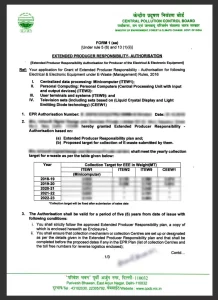Apply EPR License in 1 day and get your Custom Clearance
- Consulted 1500 + EPR Registrations
- Free Experts Assistance
- Minimum Price guaranteed
- Quick and Hassle-Free Process
- Free Consultation on Import-Export Compliance
- 20 years experience & Serving more than 4700+ companies
- Providing one stop solution for all Annual compliances
CONTACT US
Our advisor is just a call away
Introduction to EPR for E-Waste Registration
To control producers’ Extended Producer Responsibility (EPR), an EPR Authorization is needed. Producers are required to submit Form 1 of the Rules to CPCB in order to acquire an EPR Authorization. Through this online E-Waste Registration System, applicants may submit applications for the issuance of EPR Authorization online. The current module, an EPR Application module, allows for the online application and approval of EPR Authorizations. All participants in this system, including manufacturers, PROs, dismantlers, recyclers, and refurbishers, are required to register. Transporters and collecting points/centers are added to this system by producers, PROs, deconstructionists, recyclers, and refurbishers.
Who Must Register for an E-Waste License?
Regardless of the distribution method, anybody involved in the selling process, such as dealers, retailers, e-retailers, etc., is considered a producer.
(i) Producing and marketing electrical and electronic equipment, as well as the parts, accessories, and spares that go with it under its own brand.
(ii) Markets its brand to sell consumables, parts, and spares made by other suppliers or manufacturers for assembled electrical and electronic equipment.
(iii) Offers for sale imported electrical and electronic products, including parts, consumables, accessories, and replacement parts.
Duties of Producers/Manufacturers Concerning EPR Certificate for E-Waste
Producers’ duties include-
- Portal signup.
- Using the portal to find and put into practise extended producer responsibility aims in line with Schedule III and Schedule IV
- Raising awareness by using the media, publications, commercials, posters, or any other kind of communication
- Annual and quarterly returns must be submitted in the format specified on the site on or before the last day of the month that follows the quarter or year to which they pertain.
Manufacturers’ duties include-
- Register for a profile on the platform.
- Electrical and electronic equipment manufacture produces electronic waste, which should be gathered and recycled or disposed of.
- As soon as possible after the end of the month that follows the quarter or year to which the return pertains be sure to submit your annual and quarterly returns on the site in the form supplied.
Duration
EPR authorizations must be issued by the CPCB within 120 days of receiving a full application, as per E-Waste registration laws. The CPCB may verify an incomplete application and issue a checklist within 25 days.
Documentation Needed for the EPR Registration for E-Waste Process
For the E-Waste License Registration process, the following documentation is required-
- IEC Copy (Export & Import Code)
- GST Copy
- Pan Card
- Certificate of Incorporation of Pvt. Ltd.
- Last ten years’ sales detail of product if any sale previous (Quantity & Weight-Year Wise)
- Product details with model number
- Country of origin
- Contact details – Telephone, Email ID & Mobile Number
Method for Renewing EPR Registration for electronic
The EPR certificate for e-waste needs to be renewed after five years of validity. Following are the steps to renew your E-Waste EPR Registration Certificate-
- To obtain a renewal, Form-1 must be submitted within 60 days of the expiration.
- After the applicable central pollution control board or pollution control committee’s compliance report has been confirmed, renewal will be taken into account.
- If there are no breaches of the authorization terms, the renewal application will be approved. The central pollution control board keeps track of these facts in a registry.
Licence holders’ Post Registration Duties
According to the E-waste (Management) Rules, 2016, the following standards must be met by licence holders-
- Holders of a RoHS registration should have technical documentation on hand for inspection needs.
- Please provide a notification via Enclosure A to the appropriate authorities before launching any new items.
- Information about RoHS must be provided in the product booklet or brochure. Production businesses should keep records of how their e-waste is channelled. Companies that recycle materials are likewise accountable for adhering to this requirement.
- According to Form 2 of these regulations, manufacturers are required to keep track of their electronic waste and provide it to the CPCB when it conducts inspections.
- A technique or process for accumulation must be devised after the authorized EPR plan.
- Producers are required to submit an annual return to the CPCB in the specified form, namely form 3, on or before June 30th of the year after the end of the F.Y. to which the return refers.
- Manufacturers and producers are required to follow certified plans for EPR Registration for Electronic.
Why Trust Us?
The advantages listed below are available to you as a Global Solution customer-
- Our professionals offer complete solution assistance.
- Licence deliveries that occur on schedule and without delays
- Quickly identifying the legality and requirements that must be met for registration
EPR Authorization’s Function Regarding E-Waste
- Electronic items can be made more robust, repairable, and recyclable through the circular economy, lowering their lifetime environmental effect.
- The producer will be in charge of handling end-of-life waste.
- Reduces the quantity of e-waste that is disposed of improperly or shipped to developing nations for hazardous recycling.
- The expansion of the recycling sector, the creation of jobs, and the reduction of the usage of virgin materials can all have a positive economic impact.
- By shifting the cost of managing e-waste to the manufacturers, trash generation may be decreased, and sustainability may be increased.
- Its laws and policies can differ greatly from one nation to another and from region to region depending on things like enforcement, public awareness, and stakeholder participation.
- Under EPR schemes, businesses are in charge of every stage of a product’s life cycle. These programmes facilitate compliance with collection and recovery target compliance.
- Producer Responsibility Organisations (PROs) are frequently given responsibility by manufacturers and producers. As a result, adequate money is guaranteed, small and local governments can collaborate, and recycling is economical.
- Businesses are encouraged to switch to a circular economy model in order to improve their products since EPR is a potent policy tool.
Sample of a Grant Certificate for EWM






















